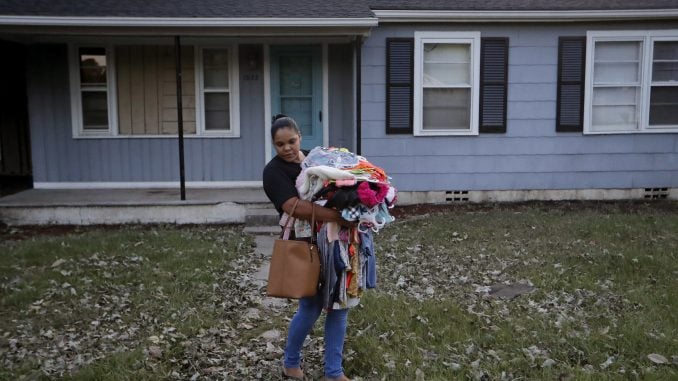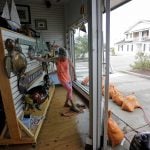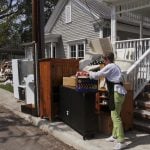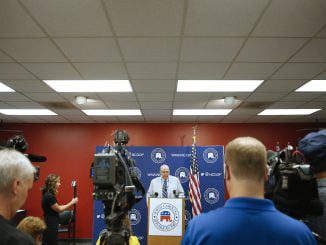
RALEIGH — On Tuesday, Governor Roy Cooper signed the multi-million spending package passed by the legislature earlier this week. The aid brings the total amount the legislature has allocated to $850 million since Florence made landfall last month. The money is intended to quickly help people and communities with immediate needs from flooding left by Hurricane Florence. The bill passed the Republican-led legislature with bipartisan support Monday evening and was signed by Cooper, a Democrat, the next day.
“This is not a time for partisan politics — this is a time to get help to people who need it so badly,” N.C. House Speaker Tim Moore
The emergency spending plan, unveiled a month after Florence slammed into the state, would help farmers and fishermen who suffered economic losses, keep college students in school despite storm-related setbacks, and repair damaged school buildings.
Most of the money would come from the state’s emergency reserves. The state has about $2 billion in rainy-day funds, and this year’s state budget left $560 million unspent.
“There’ll be no tax increases and no interruptions or disruptions from a budgetary perspective of any of our existing important programs,” said Rep. Nelson Dollar, a Raleigh-area Republican who heads the House budget-writing committee.
The Florence relief spending legislators have promised so far represents about half of the $1.5 billion Gov. Roy Cooper’s office estimated last week will be needed over a five-year recovery.
More than 30 inches of rain from Florence fell in some parts of the state, and, along with the storm surge, caused widespread flooding that damaged tens of thousands of homes and other buildings. Authorities have confirmed 40 storm-related deaths. The damage is estimated to reach billions of dollars, including at least $1.1 billion in crop and livestock losses.
The package approved Monday includes $95 million for repairing and upgrading public school, university and community college property damaged during Florence. About $7 million will help college and university students remain enrolled despite sudden, storm-related expenses.
Farmers needing to buy hay, repair roads and otherwise rebuild agricultural operations will be in line to share $50 million. Homeowners making repairs, needing mortgage help or accepting buyouts to move out of flood plains can split $23 million. Another $3.5 million goes to a program that helps low-income households that lost food because of flooding or electricity outages.
The GOP-controlled legislature started off recovery spending two weeks ago with $56 million to match federal recovery dollars, replace lost pay for school lunch workers and for other state recovery programs. Legislators expect to approve further spending next month — after elections in which most lawmakers will be seeking re-election.
Hours earlier, dozens of people from communities damaged by the storm sought out legislators to urge them to provide recovery money.
Robert Koonce Sr., 67, of Kinston, said he hoped in this time of need that politicians would suspend the intense partisan competition between legislative Republicans and Cooper’s administration.
“Let’s lay aside all this politics,” he said. “Because the truth is the storm was real, the flooding was real, the people are real, our situation is real. And we have the funding to do it. Let’s go help these people.”
Koonce said he has cousins and uncles who were wiped out in the hard-hit towns of Trenton and Pollocksville. They lost homes they had owned for decades, and now, he said, those relatives in their 60s and 70s are wondering where they’re going to live in the years ahead.
Shalonda Regan, 31, of Lumberton, said her home was badly damaged when Hurricane Matthew two years ago flooded the city and 3 feet of water washed indoors. Five months after Regan wrapped up rebuilding with a new roof and furniture, Florence pushed another 6 inches (15 centimeters) into the home’s lower level. The water buckled the wood flooring and destroyed the furniture.
Regan wants politicians to listen to what local communities consider the most important kinds of help they need. For example, her neighborhood is still stacked with soggy and moldy piles of furniture and other household trash waiting to be hauled away. The mold triggers her asthma, Regan said.
“I wanted to lend a voice from people who were actually affected,” she said. Lawmakers should “just pay closer attention to us who are on the ground being affected.”
The vote came the same day that two members of President Donald Trump’s cabinet visited Wilmington to survey damage. Ben Carson, secretary of Housing and Urban Development, and Labor Secretary Alex Acosta were both in the port city Monday escorted by Senators Richard Burr, Thom Tillis and Rep. David Rouzer. The officials were focused on the federal response to Florence.
“We like to go around and see things for ourselves, first of all to make sure that people understand that those of us in the government are just like you, we just happened to be doing this,” said Carson.
Rouzer encouraged people to continue applying for aid even if they are denied.
“Continue to apply, because your circumstances may have changed since you last applied. FEMA doesn’t see that first denial as the end of the road for you,” said Rouzer.
For guidance on applying for aid, FEMA has a booth set up at the North Carolina State Fair this week, but information is also available at one of 20 disaster assistance centers in central and eastern North Carolina or online at DisasterAssistance.gov or by calling 800-621-3362.















